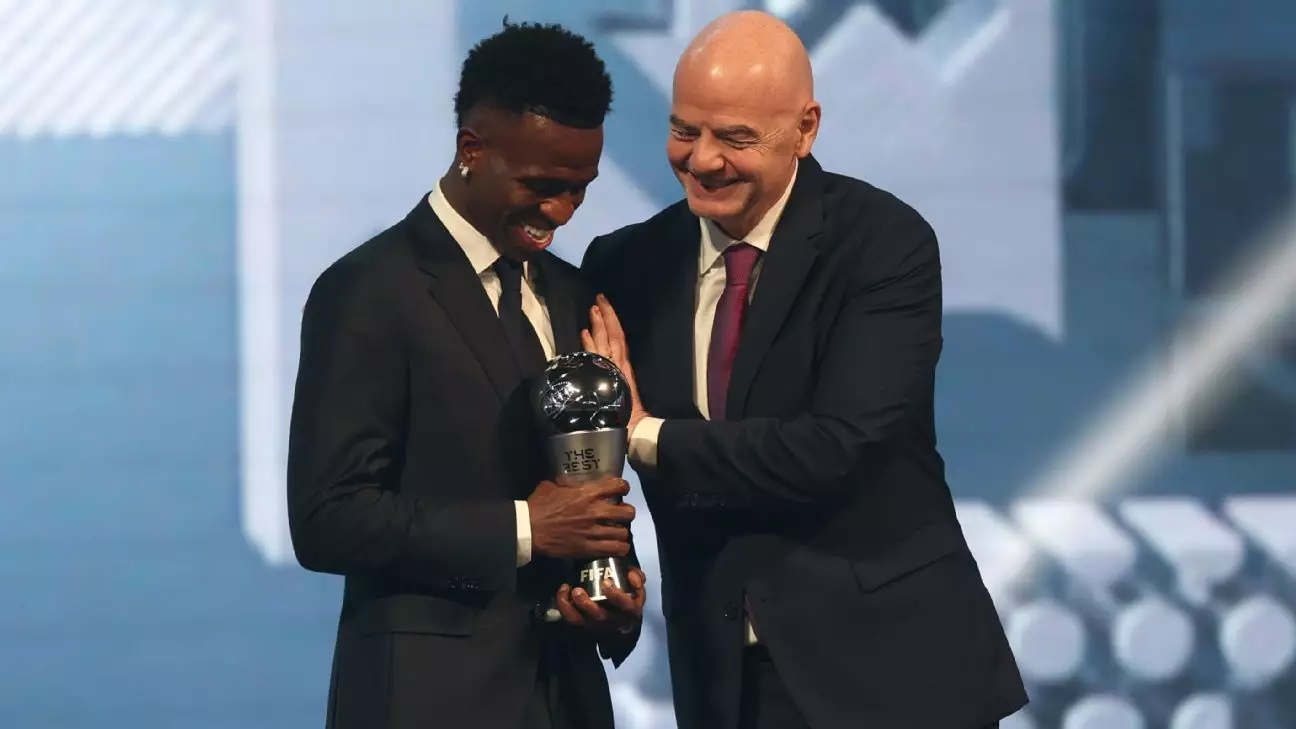Vinícius Júnior’s recent victory at FIFA’s The Best awards illustrates not only his talent on the pitch but also a profound moment of personal vindication in a career filled with both accolades and skepticism. As the Real Madrid forward claimed the award for the best men’s player of 2024, he directed a pointed response to his critics who have attempted to undermine his achievements. This victory offers a rich lens through which we can explore themes of resilience, the nature of sports recognition, and the relentless pursuit of validation.
At just 24 years old, Vinícius has established himself as one of football’s most dynamic players. Earning the prestigious award with 48 points—a clear lead over notable contenders such as Rodri and his teammate Jude Bellingham—marks a significant achievement in his young career. While the accolade itself is a symbol of excellence, it is largely seen as a rebuttal to the skepticism and scrutiny he has faced throughout his journey. The award serves not only as recognition of his skill but also as a powerful affirmation against the narrative that seeks to diminish his accomplishments.
In a heartfelt Instagram post following his win, Vinícius expressed gratitude and pride, emphasizing that this achievement was well-earned and long-deserved. He articulated a deep personal history of struggle, stating, “They have tried and tried to invalidate me.” This outcry resonates with many athletes who often feel that their contributions are subject to external evaluations that do not reflect their hard work and dedication. By winning The Best award, Vinícius not only celebrates a personal milestone but also sends a message to aspiring players around the world: persistence in the face of adversity is key.
The backdrop to this triumph was the recent Ballon d’Or ceremony, where Vinícius did not receive the honor despite his pivotal role in helping Real Madrid secure a La Liga and Champions League double in the 2023-24 season. Rodri, who played a key role in Manchester City’s success, was awarded the laurels instead, which sparked controversy and division within the football community. Real Madrid’s subsequent boycott of the event highlighted a growing frustration with the voting processes of prestigious awards. Club president Florentino Perez’s criticisms reflect a larger dialogue within the sport concerning the narratives shaped by awards and accolades—narratives that can sometimes overshadow the achievements of deserving players.
The contrast between the Ballon d’Or snub and FIFA’s acknowledgement illustrates an intriguing facet of sports recognition. It raises questions about the criteria used to evaluate success and the various ways achievements can be interpreted. While recognition from FIFA comes with the weight of combined votes from coaches, journalists, and fans, the exclusive nature of the Ballon d’Or often alienates players who are deserving of acknowledgment.
Throughout his journey, Vinícius has credited not only his family and clubs like Flamengo and Real Madrid for his success but also the broader community of fans and teammates who have supported him. The narrative he presents is one of collective triumph—a testament to the fact that individual success is rarely achieved in isolation. His victory can also symbolize the resilience of marginalized communities in sport. Coming from São Gonçalo, a place often overlooked in terms of sports prominence, Vinícius embodies the hopes of many who face systemic challenges in pursuing their dreams.
Furthermore, the recognition he received from fellow athletes, such as Neymar, underscores the importance of camaraderie in sports. When peers celebrate each other’s successes, it reinforces a culture of mutual encouragement and respect, which is vital in an industry often marred by competition and jealousy.
As he navigates this pivotal moment in his career, Vinícius Júnior stands at the forefront of football’s evolving landscape. His determination and resilience make it clear that this victory is just a stepping stone for future aspirations. Whether he continues to elevate his game or inspires a new generation of players, his story reminds us that while awards are significant, the journey and how one overcomes obstacles hold even greater meaning.
His trajectory will surely influence young athletes globally, encouraging them not only to strive for excellence but also to stand firm against criticism that attempts to devalue their worth. In the realm of sports, where success is often defined by awards, Vinícius has emerged as a poignant reminder: the ultimate recognition comes from within.

